动词时态
语文动词的时态

语文动词的时态
动词时态是语文中一个非常重要的概念,它用来表示动作发生的时间。
在汉语中,动词的时态分为过去时、现在时和将来时三种。
本文将详细介绍这三种时态的用法和特点。
一、过去时
过去时表示的是动作或状态发生在过去的时间。
在动词前加上了表示过去的助动词“了”,或者使用过去时的动词形式。
例如:
1. 昨天我去了图书馆。
- 这句话中,“去了”表示的是过去发生的动作。
2. 我小时候喜欢看动画片。
- 这句话中,“喜欢”表示的是过去的状态。
过去时还可以用来表示过去的经历、习惯或者某个事件的发生频率等。
二、现在时
现在时表示的是动作或状态发生在现在的时间。
例如:
1. 我正在写作业。
- 这句话中,“正在写”表示的是现在正在进行的动作。
2. 我喜欢吃水果。
- 这句话中,“喜欢吃”表示的是现在的状态或习惯。
现在时还可以用来表示客观事实、普遍真理以及对现在的预测等。
三、将来时
将来时表示的是动作或状态将要发生在将来的时间。
例如:
1. 下个月我将去北京旅游。
- 这句话中,“将去”表示的是将来要发生的动作。
2. 明天他会给我打电话。
- 这句话中,“会给”表示的是将来会发生的动作。
将来时还可以用来表示打算、意愿、推测等。
总结起来,动词的时态对于表达准确的时间非常重要。
正确使用动词的时态可以使语言更加准确、简洁、生动。
在写作时,我们要根据句子的语境和需要选择适当的时态,使表达更加准确和流畅。
材料来源:教材参考资料。
英语动词时态和语态
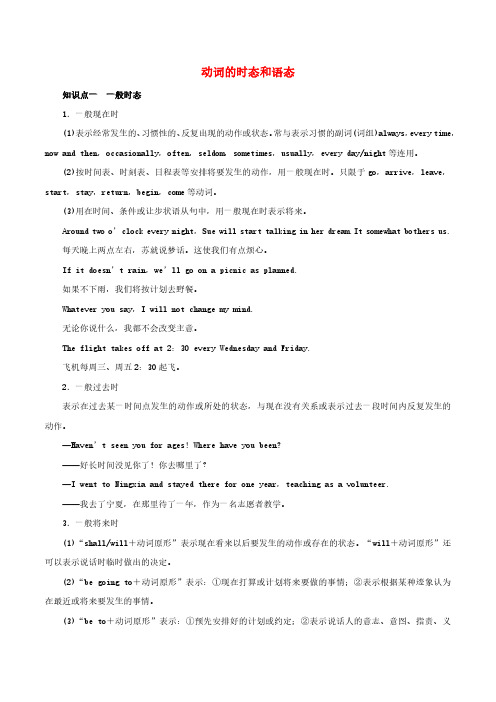
动词的时态和语态知识点一一般时态1.一般现在时(1)表示经常发生的、习惯性的、反复出现的动作或状态。
常与表示习惯的副词(词组)always,every time,now and then,occasionally,often,seldom,sometimes,usually,every day/night等连用。
(2)按时间表、时刻表、日程表等安排将要发生的动作,用一般现在时。
只限于go,arrive,leave,start,stay,return,begin,come等动词。
(3)用在时间、条件或让步状语从句中,用一般现在时表示将来。
Around two o’clock every night,Sue will start talking in her dream.It somewhat bothers us.每天晚上两点左右,苏就说梦话。
这使我们有点烦心。
If it doesn’t rain,we’ll go on a picnic as planned.如果不下雨,我们将按计划去野餐。
Whatever you say,I will not change my mind.无论你说什么,我都不会改变主意。
The flight takes off at2:30every Wednesday and Friday.飞机每周三、周五2:30起飞。
2.一般过去时表示在过去某一时间点发生的动作或所处的状态,与现在没有关系或表示过去一段时间内反复发生的动作。
—Haven’t seen you for ages!Where have you been?——好长时间没见你了!你去哪里了?—I went to Ningxia and stayed there for one year,teaching as a volunteer.——我去了宁夏,在那里待了一年,作为一名志愿者教学。
3.一般将来时(1)“shall/will+动词原形”表示现在看来以后要发生的动作或存在的状态。
动词的时态和语态
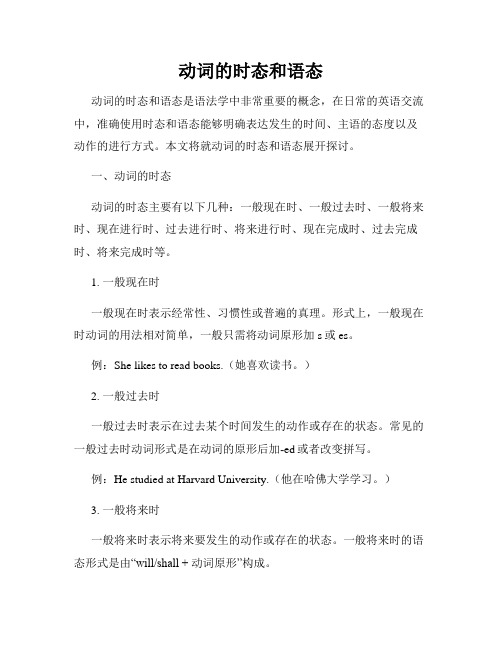
动词的时态和语态动词的时态和语态是语法学中非常重要的概念,在日常的英语交流中,准确使用时态和语态能够明确表达发生的时间、主语的态度以及动作的进行方式。
本文将就动词的时态和语态展开探讨。
一、动词的时态动词的时态主要有以下几种:一般现在时、一般过去时、一般将来时、现在进行时、过去进行时、将来进行时、现在完成时、过去完成时、将来完成时等。
1. 一般现在时一般现在时表示经常性、习惯性或普遍的真理。
形式上,一般现在时动词的用法相对简单,一般只需将动词原形加s或es。
例:She likes to read books.(她喜欢读书。
)2. 一般过去时一般过去时表示在过去某个时间发生的动作或存在的状态。
常见的一般过去时动词形式是在动词的原形后加-ed或者改变拼写。
例:He studied at Harvard University.(他在哈佛大学学习。
)3. 一般将来时一般将来时表示将来要发生的动作或存在的状态。
一般将来时的语态形式是由“will/shall + 动词原形”构成。
例:I will go to the park tomorrow.(明天我将去公园。
)4. 现在进行时现在进行时表示正在进行的动作。
现在进行时的时态形式是由“be 动词(am/is/are)+动词-ing形式”构成。
例:They are playing basketball now.(他们现在正在打篮球。
)5. 过去进行时过去进行时表示过去某个时间正在进行的动作。
过去进行时的时态形式是由“was/were + 动词-ing形式”构成。
例:He was studying at the library yesterday.(昨天他在图书馆学习。
)6. 将来进行时将来进行时表示将来某个时间正在进行的动作。
将来进行时的时态形式是由“will be + 动词-ing形式”构成。
例:They will be traveling to Europe next month.(他们下个月将要去欧洲旅行。
动词时态详解

动词时态详解动词时态是指动词表示的动作或状态所发生的时间。
在英语中,有多种不同的时态,每种时态都有其独特的用法和含义。
以下是对一些常见动词时态的详细解释:1. 现在时态 (Present Tense)- 一般现在时 (Simple Present): 用于表达经常性的动作、客观事实、普遍真理等。
- 现在进行时 (Present Continuous): 用于表示正在进行的动作。
- 现在完成时 (Present Perfect): 用于表示过去发生的动作与现在的关系,强调结果或经验。
- 现在完成进行时 (Present Perfect Continuous): 用于表示过去开始并一直持续到现在的动作。
2. 过去时态 (Past Tense)- 一般过去时 (Simple Past): 用于表达过去发生的动作或状态。
- 过去进行时 (Past Continuous): 用于表示过去某一时刻正在进行的动作。
- 过去完成时 (Past Perfect): 用于表示过去某一动作或状态在另一过去时间点之前发生。
- 过去完成进行时 (Past Perfect Continuous): 用于表示过去某一时间点之前已开始并持续到另一时间点的动作。
3. 将来时态 (Future Tense)- 一般将来时(Simple Future): 用于表示将来发生的动作或状态。
- 将来进行时 (Future Continuous): 用于表示将来某一时刻正在进行的动作。
- 将来完成时 (Future Perfect): 用于表示将来某一时间点之前已经完成的动作。
- 将来完成进行时 (Future Perfect Continuous): 用于表示将来某一时间点之前已开始并持续到另一时间点的动作。
以上是关于常见动词时态的简要说明。
对于每种时态,还有其他细节和规则需要进一步了解和掌握。
在使用动词时态时,确保根据具体语境和需要选择合适的时态,以便准确地表达你的意思。
常见的动词时态

常见的动词时态现代汉语中,动词时态包括了一般现在时、一般过去时、一般将来时以及现在进行时等多种形式。
在日常交流中,人们常常使用这些动词时态来准确地表达出事物的状态、发展趋势以及时间关系等。
下面将详细介绍常见的动词时态及其使用。
一、一般现在时一般现在时是描述现在或普遍存在的状态或情况。
一般现在时最常用的句型是主语+谓语动词。
例如:1. He studies English every day. (他每天学习英语。
)2. The sun rises in the east. (太阳从东方升起。
)二、一般过去时一般过去时用于描述过去已经发生或完成的动作或状态。
一般过去时的句型是主语+谓语动词的过去式。
例如:1. She lived in London for five years. (她在伦敦住了五年。
)2. They played soccer yesterday. (他们昨天踢足球。
)三、一般将来时一般将来时用于表示将来发生或完成的动作或状态。
一般将来时的句型是主语+will+谓语动词的原形。
例如:1. I will call you tomorrow. (我明天会给你打电话。
)2. They will arrive at six o'clock. (他们会在六点到达。
)四、现在进行时现在进行时用于描述目前正在进行的动作或状态。
现在进行时的句型是主语+be动词(am/is/are)+动词ing形式。
例如:1. He is studying in the library right now. (他现在正在图书馆学习。
)2. They are playing basketball in the park. (他们正在公园里打篮球。
)除了以上四种常见的动词时态,汉语中还有其他时态形式,如过去进行时、将来进行时、过去将来时等。
这些时态在语法上较为复杂,使用频率也相对较低,因此在日常交流中较少使用,不在本文的范围内进行详细介绍。
英语十六种动词时态归纳表
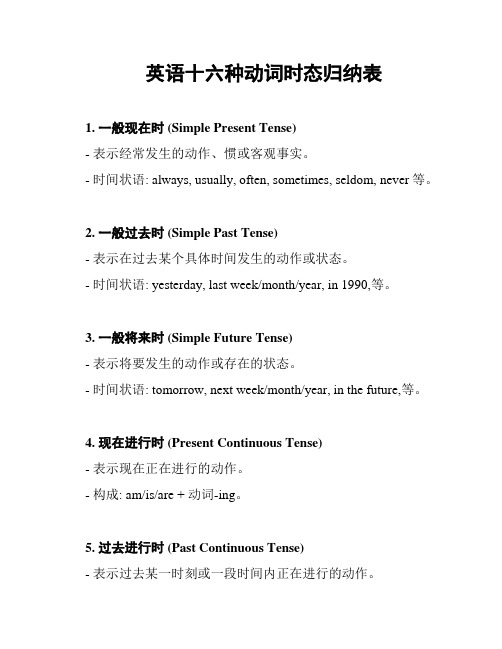
英语十六种动词时态归纳表1. 一般现在时 (Simple Present Tense)- 表示经常发生的动作、惯或客观事实。
- 时间状语: always, usually, often, sometimes, seldom, never等。
2. 一般过去时 (Simple Past Tense)- 表示在过去某个具体时间发生的动作或状态。
- 时间状语: yesterday, last week/month/year, in 1990,等。
3. 一般将来时 (Simple Future Tense)- 表示将要发生的动作或存在的状态。
- 时间状语: tomorrow, next week/month/year, in the future,等。
4. 现在进行时 (Present Continuous Tense)- 表示现在正在进行的动作。
- 构成: am/is/are + 动词-ing。
5. 过去进行时 (Past Continuous Tense)- 表示过去某一时刻或一段时间内正在进行的动作。
- 构成: was/were + 动词-ing。
6. 将来进行时 (Future Continuous Tense)- 表示将来某一时刻或一段时间内正在进行的动作。
- 构成: will be + 动词-ing。
7. 现在完成时 (Present Perfect Tense)- 表示动作对现在造成的影响或状态。
- 构成: have/has + 过去分词。
8. 过去完成时 (Past Perfect Tense)- 表示在过去某一时间点或动作之前已经发生的动作。
- 构成: had + 过去分词。
9. 将来完成时 (Future Perfect Tense)- 表示在将来某一时间点之前将会发生的动作。
- 构成: will have + 过去分词。
10. 现在完成进行时 (Present Perfect Continuous Tense)- 表示从过去某一时刻开始一直延续到现在且可能继续下去的动作或状态。
动词时态总结一览表
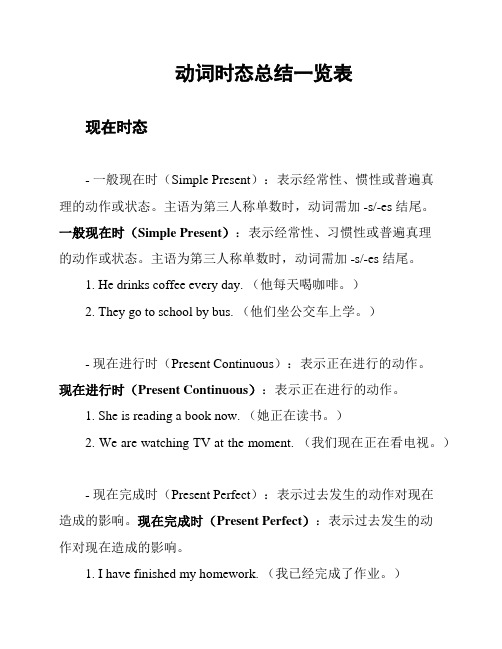
动词时态总结一览表现在时态- 一般现在时(Simple Present):表示经常性、惯性或普遍真理的动作或状态。
主语为第三人称单数时,动词需加 -s/-es 结尾。
一般现在时(Simple Present):表示经常性、习惯性或普遍真理的动作或状态。
主语为第三人称单数时,动词需加 -s/-es 结尾。
1. He drinks coffee every day. (他每天喝咖啡。
)2. They go to school by bus. (他们坐公交车上学。
)- 现在进行时(Present Continuous):表示正在进行的动作。
现在进行时(Present Continuous):表示正在进行的动作。
1. She is reading a book now. (她正在读书。
)2. We are watching TV at the moment. (我们现在正在看电视。
)- 现在完成时(Present Perfect):表示过去发生的动作对现在造成的影响。
现在完成时(Present Perfect):表示过去发生的动作对现在造成的影响。
1. I have finished my homework. (我已经完成了作业。
)2. They have lived here for two years. (他们在这里住了两年了。
)- 现在完成进行时(Present Perfect Continuous):表示动作从过去一直延续到现在。
现在完成进行时(Present Perfect Continuous):表示动作从过去一直延续到现在。
1. They have been playing basketball for two hours. (他们已经打了两个小时的篮球了。
)2. I have been studying English for five years. (我已经研究英语五年了。
)过去时态- 一般过去时(Simple Past):表示过去某个时间发生的动作或状态。
动词16种时态形式一览表

动词16种时态形式一览表动词是表示动作、行为、状态或存在的词语。
它们根据具体时间的不同变化形成不同的时态。
一共有16种时态,分为现在时态、过去时态和将来时态。
现在时态有4种形式:一般现在时、现在进行时、现在完成时和现在完成进行时。
一般现在时表示经常发生的动作、行为或客观事实,通常与副词always、often、usually等连用,也可与时间状语连用。
例如:I play basketball every Sunday.(我每个星期天打篮球。
)现在进行时表示正在进行的动作或当前的状态,由be动词和动词的现在分词构成。
例如:She is studying for the exam.(她正在为考试复习。
)现在完成时表示过去发生的动作对现在造成的影响或结果,由have/has + 过去分词构成。
例如:We have visited the museum.(我们参观过博物馆。
)现在完成进行时表示过去一段时间内一直持续进行的动作,由have/has + been + 动词的现在分词构成。
例如:He has been working on this project for two months.(他已经工作在这个项目上两个月了。
)过去时态有4种形式:一般过去时、过去进行时、过去完成时和过去完成进行时。
一般过去时表示过去某个时间发生或存在的动作、行为或状态,常与表示过去的时间状语连用。
例如:I went to the park yesterday.(昨天我去了公园。
)过去进行时表示过去正在进行的动作或状态,由过去式的be动词和动词的现在分词构成。
例如:She was sleeping when I called her.(我给她打电话的时候,她正在睡觉。
)过去完成时表示过去某个时间或动作之前已经完成的动作,由had + 过去分词构成。
例如:They had already left when I arrived.(当我到达时,他们已经离开了。
动词的时态变化
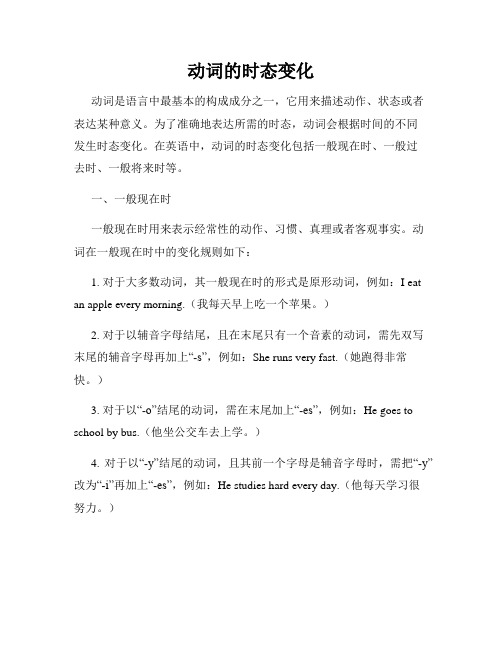
动词的时态变化动词是语言中最基本的构成成分之一,它用来描述动作、状态或者表达某种意义。
为了准确地表达所需的时态,动词会根据时间的不同发生时态变化。
在英语中,动词的时态变化包括一般现在时、一般过去时、一般将来时等。
一、一般现在时一般现在时用来表示经常性的动作、习惯、真理或者客观事实。
动词在一般现在时中的变化规则如下:1. 对于大多数动词,其一般现在时的形式是原形动词,例如:I eat an apple every morning.(我每天早上吃一个苹果。
)2. 对于以辅音字母结尾,且在末尾只有一个音素的动词,需先双写末尾的辅音字母再加上“-s”,例如:She runs very fast.(她跑得非常快。
)3. 对于以“-o”结尾的动词,需在末尾加上“-es”,例如:He goes to school by bus.(他坐公交车去上学。
)4. 对于以“-y”结尾的动词,且其前一个字母是辅音字母时,需把“-y”改为“-i”再加上“-es”,例如:He studies hard every day.(他每天学习很努力。
)5. 对于以“-y”结尾的动词,且其前一个字母是元音字母时,只需在末尾加上“-s”,例如:I play tennis with my friends on weekends.(我周末和我的朋友们打网球。
)二、一般过去时一般过去时用来表示过去发生的动作或状态。
动词在一般过去时中的变化规则如下:1. 对于大多数动词,需要在原形动词的末尾加上“-ed”,例如:She studied English last night.(昨晚她学习了英语。
)2. 对于以“-e”结尾的动词,只需在末尾加上“-d”,例如:I lived in London for two years.(我在伦敦住了两年。
)3. 对于以辅音字母结尾,且在末尾只有一个音素的重读闭音节动词,需先双写末尾的辅音字母再加上“-ed”,例如:He stopped the car suddenly.(他突然停下了车。
动词的四种时态

动词的四种时态动词的四种时态 时态是⼀种动词形式,不同的时态⽤以表⽰不同的时间与⽅式。
它是表⽰⾏为、动作、状态在各种时间条件下的动词形式,在英语中有16种时态。
以下是⼩编为⼤家整理的动词的四种时态相关内容,仅供参考,希望能够帮助⼤家。
动词的四种时态1 (1)⼀般现在时: ⼀般现在时的构成 1. be动词:主语+be(am, is, are)+其它。
如: I am a boy. 我是⼀个男孩。
2. ⾏为动词:主语+⾏为动词(+其它)。
如: We study English. 我们学习英语。
当主语为第三⼈称单数(he, she, it)时,要在动词后加"-s"或"-es"。
如:Mary likes Chinese.玛丽喜欢汉语。
动词+s的变化规则 1.⼀般情况下,直接加-s,如:cook-cooks, milk-milks 2.以s. x. sh. ch. o结尾,加-es,如:guess-guesses, wash-washes, watch-watches, go-goes 3.以“辅⾳字母+y”结尾,变y为i, 再加-es,如:study-studies (2)⼀般过去时: 动词过去式详解动词的过去式的构成规则有: A、规则动词 ①⼀般直接在动词的后⾯加ed:如 worked , learned , cleaned , visited ②以e结尾的动词直接加d:如 lived , danced , used ③以辅⾳字母加y结尾的动词要改y为i再加ed(此类动词较少)如 study – studied carry – carried worry – worried (注意play、stay不是辅⾳字母加y,所以不属于此类) ④双写最后⼀个字母(此类动词较少)如 stopped B、不规则动词(此类词并⽆规则,须熟记)⼩学阶段要记住以下动词的原形和过去式:sing – sang , eat – ate , see – saw , have – had , do – did , go – went , take – took , buy – bought , get – got , read – read ,fly – flew , am/is – was , are – were , say – said , leave – left , swim – swam , tell – told , draw – drew , come – came , lose – lost , find – found , drink – drank , hurt – hurt , feel – felt (3)⼀般将来时: 基本结构: ①be going to + do; ②will+ do. be going to = will I am going to go swimming tomorrow(明天). = I will go swimming tomorrow. (4)现在进⾏时: am,is,are+动词现在分词 动词现在分词详解动词的ing形式的构成规则: ①⼀般的直接在后⾯加上ing , 如doing , going , working , singing , eating ②以e 结尾的动词,要先去e再加ing ,如having , writing ③双写最后⼀个字母的(此类动词极少)有:running , swimming , sitting , getting 动词的四种时态2 ⼀般现在时 主要⽤来表⽰⼈、事物的现在状况和特点;表⽰经常或习惯性的动作,句⼦中常有often, always, from time to time 等时间状语;表⽰客观规律和永恒真理等。
动词时态语法

时态是英语中一个重要的语法范畴,它表示不同时间发生的动作或存在的状态以及动作发生或存在的方式。
动作发生的时间可分为现在、过去、将来和过去将来四种形式,动作发生的方式可分为一般、完成、进行和完成进行四种形式。
将这时间形式和动作方式结合起来,就构成了以下16种时态形式(以do 为例):注:构成时态的助动词be (is, am, are), have (has, have), shall, will 等需根据主语的变化来选择。
在这16种时态中,其中有8种时态是最重要的,也是用得最多的,是初学者必须要掌握的,它们是一般现在时(也称一般现在时)、一般过去时(也称一般过去时)、一般将来时(也称一般将来时)、现在进行时、现在完成时、过去进行时、过去完成时、过去将来一般时(也称过去将来时),其余的时态相对用得较少二、动词时态详解:一般现在时1. 如何理解一般现在时一般现在时是英语所有时态中用得最普通的一种时态,它主要表示经常性或习惯性发生的动作或存在的状态。
如:We get up at six every day. 我们每天6点起床。
I often do exercise and I am very healthy. 我经常搞锻炼,身体很好。
2. 一般现在时的构成与用法一般现在时的谓语动词通常用原形,若主语为第三人称单数,由谓语动词也用第三人称单数。
3. 一般现在时态的用法补充(1)表示目前的状态:即表示现阶段句子主语所处于的状态。
如:The boy is ill. 这个男孩病了。
The library is closed now. 图书馆已经关门了。
(2)表示心理倾向:即表示现阶段句子主语的想法或心理倾向。
如:I hope to see you this evening. 我希望今天晚上见你。
He wants me to do it at once. 他想要我马上就做这事。
(3)表示客观真理。
The earth turns around the sun. 地球绕着太阳转。
动词时态-常用9种

常用9种动词时态一般现在时,一般过去时,一般将来时,现在进行时,过去进行时,将来进行时;现在完成时,过去完成时,过去将来时;一、一般现在时1.概念:经常、反复发生的动作或行为及现在的某种状况。
2.时间状语:Always, usually, often, sometimes, every week (day, year, month…), once a week(day, year, month…), on Sundays,3.基本结构:动词原形(如主语为第三人称单数,动词上要改为第三人称单数形式)4.否定形式:主语+am/is/are +not+其他; 此时态的谓语动词若为行为动词,则在其前加don't, 如主语为第三人称单数,则用doesn't,同时还原行为动词。
5.一般疑问句:把be动词放于句首;用助动词do提问,如主语为第三人称单数,则用does,同时,还原行为动词。
6.例句:It seldom snows here.这里很少下雪。
He is always ready to help others.他总是乐于帮助别人。
Action speaks louder than words.事实胜于雄辩。
二、一般过去时1.概念:过去某个时间里发生的动作或状态;过去习惯性、经常性的动作、行为。
2.时间状语:ago, yesterday, the day before yesterday, last week, last(year, night, month…), in 1989, just now, at the age of 5, one day, long long ago, onceupon a time, etc.3.基本结构:主语+动词或be的过去时+名词4.否定形式:主语+was/were +not+其他;在行为动词前加didn't,同时还原行为动词。
5.一般疑问句:was或were放于句首;用助动词do的过去式did 提问,同时还原行为动词。
动词时态简单8种

一、一般现在时二、一般过去时三、一般将来时四、过去将来时五、现在进行时六、过去进行时七、现在完成时八、过去完成时时态(Tense)是表示行为、动作和状态在各种时间条件下的动词形式。
因此,当我们说时态结构的时候,指的是相应时态下的动词形式。
一、一般现在时(一)、含义表示经常发生的动作或经常存在的状态,以动词原形表示(单数第三人称用动词的-s 形式)。
否定句和各种疑问句靠特殊疑问词助动词do (does)构成。
动词第三人称单数的变化规则:(二)、用法A) 表示现在发生的动作或状况,或反复、习惯性的动作:表示一直贯穿或反复发生于包括现在在内的整个时间的动作或状态(这是该时态最重要的用法),常用频度时间状语:always,often,seldom,sometimes,usually,never ,hardly,every day(week,...),once(twice,...),a day(week,...)等。
例如:Does he go running three times a week? 他每周跑步三次吗?He always helps others. 他总是帮助别人。
She lives in a large house. 她住在一间大屋里。
She doesn’t know how to say that in English.He leaves for school at 6:30 AM.B)表示客观真理和科学事实:表示没有时间限制的客观真理和科学事实。
例如:What boils at 100℃?----Water does什么在摄氏度100度沸腾?----水The sky is blue.The earth travels round the sun.Paris is the capital of France.C)表示现刻行为:表示具有持续性(或长或短)的现在发生行为(多为状态动词)。
例如:I agree with you completely. Don’t doubt it.我完全同意你的意见。
英语动词的十二种时态

英语动词的十二种时态-CAL-FENGHAI.-(YICAI)-Company One1十二种时态形式①一般现在时:定义:表示现在阶段习惯性或经常性发生的动作或存在的状态。
构成: to do, to have, to be.Eg. I do it every day.(我每天做这样的事。
)②现在进行时:定义:表示正在进行或发生的动作。
构成:助动词be+现在分词。
Eg. I am doing it now.(现在我正在做这件事。
)③现在完成时:定义:表示过去某一动作对现在的影响或过去某一动作持续到现在,也可能还要继续下去。
构成:have/has+过去分词。
Eg. I have done it already.(我已把这件事做好了。
)④现在完成进行时:定义:表示动作从过去某一时间开始,一直延续到现在,可能还要继续下去。
构成:have/has been+现在分词。
Eg. I have been doing it for two days.(这件工作我已做了两天了。
──说话时工作尚未做完,所以还得继续做)。
⑤一般过去时:定义:表示过去某时发生的动作或存在的状态。
构成:动词+ed。
Eg. I did it yesterday.(昨天我做了这件事。
)⑥过去进行时:定义:表示过去某一时刻或某一阶段内正在进行的动作。
构成:was/were+现在分词。
Eg. I was doing it at that time.(当时我正在做这件事。
)⑦过去完成时:定义:表示在过去某一时刻以前已经完成的动作,强调“过去的过去”。
构成:had+过去分词。
Eg. I have done it before I went home yesterday.(昨天我在回家之前就把那件工作做完了)。
⑧过去完成进行时:定义:表示动作从过去,某一时间之前开始,到某一时间仍在进行或刚刚结束。
构成:had been+现在分词。
Eg. I had been doing the work for two hours when the teacher came.(老师来时那件工作我已做了两小时了。
英语动词时态表
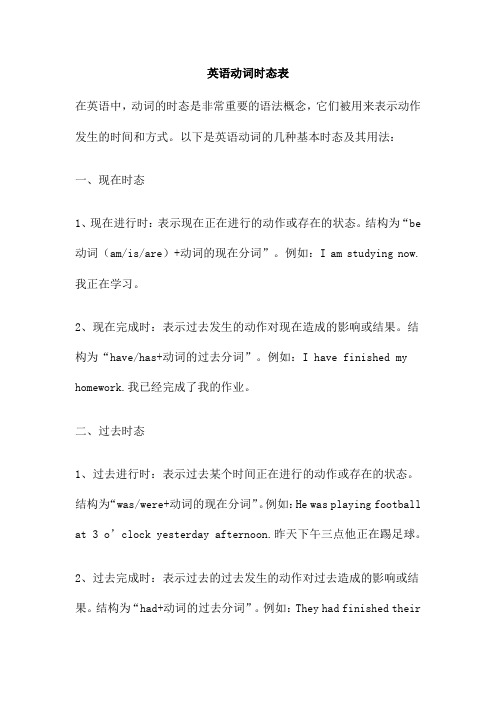
英语动词时态表在英语中,动词的时态是非常重要的语法概念,它们被用来表示动作发生的时间和方式。
以下是英语动词的几种基本时态及其用法:一、现在时态1、现在进行时:表示现在正在进行的动作或存在的状态。
结构为“be 动词(am/is/are)+动词的现在分词”。
例如:I am studying now.我正在学习。
2、现在完成时:表示过去发生的动作对现在造成的影响或结果。
结构为“have/has+动词的过去分词”。
例如:I have finished my homework.我已经完成了我的作业。
二、过去时态1、过去进行时:表示过去某个时间正在进行的动作或存在的状态。
结构为“was/were+动词的现在分词”。
例如:He was playing football at 3 o’clock yesterday afternoon.昨天下午三点他正在踢足球。
2、过去完成时:表示过去的过去发生的动作对过去造成的影响或结果。
结构为“had+动词的过去分词”。
例如:They had finished theirwork before we came.在我们来到之前,他们已经完成了他们的工作。
三、将来时态1、将来进行时:表示将来某个时间正在进行的动作或存在的状态。
结构为“will be+动词的现在分词”。
例如:I will be studying at 8 o’clock tomorrow morning.我将在明天早上八点学习。
2、将来完成时:表示将来某个时间已经完成的动作或存在的状态。
结构为“will have+动词的过去分词”。
例如:I will have finished my homework by 10 o’clock tomorrow night.我将在明天晚上十点之前完成我的作业。
以上是英语动词的几种基本时态及其用法,理解和掌握这些时态对于正确使用英语有着重要的意义。
在英语中,动词的时态是非常重要的语法概念,因为它表达了动作发生的时间和状态。
(完整版)动词的时态和语态变化规则

(完整版)动词的时态和语态变化规则一、动词的时态变化规则动词的时态指的是动作发生的时间。
汉语中的动词时态有三种形式:过去时、现在时和将来时。
下面是动词在不同时态下的变化规则:1. 过去时动词的过去时表示动作或状态发生在过去的时间。
在汉语中,动词的过去时通常通过在动词前加上过去时标志词(如“了”、“过”、“了解”等)来表示。
例如:- 我昨天去了图书馆。
- 她去年去过美国。
2. 现在时动词的现在时表示动作或状态发生在现在的时间。
在汉语中,动词的现在时可以通过以下几种方式来表示:- 在动词前面加上表示现在的时间状语(如“现在”、“正在”、“每天”等)- 在动词前面加上表示频率的词语(如“经常”、“常常”、“总是”等)例如:- 我现在在写作业。
- 他经常打篮球。
3. 将来时动词的将来时表示动作或状态将要发生的时间。
在汉语中,动词的将来时可以通过以下几种方式来表示:- 在动词前面加上表示将来的时间状语(如“明天”、“以后”、“将来”等)- 在动词前面加上表示计划或意向的词语(如“打算”、“计划”、“想要”等)例如:- 我明天要去游乐园。
- 她打算明年去留学。
二、动词的语态变化规则动词的语态表示动作的主体与动作的关系。
汉语中的动词语态有两种形式:主动语态和被动语态。
1. 主动语态在主动语态中,动作的执行者是动词的主语。
这种语态表达的是动作的主体主动地执行了动作。
例如:- 她写了一首诗。
- 我们清理了房间。
2. 被动语态在被动语态中,动作的执行者是动词的宾语。
这种语态强调的是动作的接受者。
被动语态的构成是:动词“是/被” + 动词的过去分词。
例如:- 这篇文章被他认为很好。
- 这个问题被我们解决了。
以上是动词的时态和语态变化的基本规则,希望对您有所帮助。
十六种英语动词的时态(打印版)

十六种英语动词的时态英语共有16种时态,根据近几年曝光的四、六级考卷分析,时态测试重点主要有:完成时态——现在完成时、过去完成时、将来完成时;进行时态——现在进行时、过去进行时、将来进行时、完成进行时;一般时态。
一、一般时态1、一般现在时(1) 一般现在时表示没有时限的持久存在的动作或状态或现阶段反复发生的动作或状态,常和副词usually,often,always sometimes,regularly,near,occasionally,every year, every week 等连用。
例如:1)The moon moves round the earth.2)Mr. Smith travels to work by bus every day.(2)在由after,until,before,once,when,even if,in case,as long as,as soon as,the moment 以及if,unless 等引导的时间状语从句或条件状语从句中,通常用一般现在时代替将来时。
例如:1)I will tell him the news as soon as I see him.2)I will not go to countryside if it rains tomorrow.(3)某些表示起始的动词,可用一般现在时表示按规定、计划或安排要发生的动作,这类动词有:be,go,come,start,depart,arrive,begin,leave 等。
例如:1)The plane leaves at three sharp.2)The new teachers arrive tomorrow.(4)在由why,what,where,whoever,who,that,as 等引导的从句中,也常用一般现在时代替将来时。
例如:1)Free tickets will be given to whoever comes first.2)You'll probably be in the same train as I am tomorrow.2.一般过去时(1)表示过去某一特定时间所发生的、可完成的动作或状态,常与表示确切过去时间的词、短语或从句连用。
- 1、下载文档前请自行甄别文档内容的完整性,平台不提供额外的编辑、内容补充、找答案等附加服务。
- 2、"仅部分预览"的文档,不可在线预览部分如存在完整性等问题,可反馈申请退款(可完整预览的文档不适用该条件!)。
- 3、如文档侵犯您的权益,请联系客服反馈,我们会尽快为您处理(人工客服工作时间:9:00-18:30)。
动词时态和语态1. I’m calling about the apartment you ______ the other day. Could you tell me more about it?A. advertisedB. had advertisedC. are advertisingD. will advertise2. Shakespeare’s play Hamlet ______ into at least ten different films over the past years.A. had been made .B. was madeC. has been madeD. would be made3. --- Do you think Mom and Dad ______ late?--- No, Swiss Air is usually on time.A. wereB. will beC. would beD. have been4. Hurry up! Mark and Carl ______ us.A. expectB. are expectingC. have expectedD. will expect5. --- So what is the procedure?--- All the applicants ______ before a final decision is made by the authority.A. interviewB. are interviewingC. are interviewedD. are being interviewed6. The famous musician, as well as his students, ____ to perform at the opening ceremony of the2012 Taipei Flower Expo.A. were invitedB. was invitedC. have been invitedD. has been invited7. The girl has a great interest in sport and ____ badminton classes twice a week over the last threeyears.A. tookB. is takingC. takesD. has been taking8. “What do you want to be?” asked Mrs. Crawford. “Oh,I________ president,” said the boy, with a smile.A.have been B.am C.was D.will be9. Around two o'clock every night, Sue will start talking in her dream. It somewhat ________ us.A.bothers B.had bothered C.would bother D.bothered10. If nothing ________, the oceans will turn into fish deserts.A.doe s B.had been doneC.will do D.is done11.—Have you heard about the recent election?—Sure, it ________the only thin g on the news for the last three days.A.would be B.isC.has been D.will be12.—I don't understand why you didn't go to the lecture yesterday aftermoon.—I'm so sorry, But I ________ my homework.A.had done B.was doingC.would do D.am doing13. Generally, students’ inner motivation with high expectations from others ______ essential totheir development.A. isB. areC. wasD. were14.—Could I use your car tomorrow morning?—Sure. I ______ a report at home.A. will be writingB. will have writtenC. have writtenD. have been writing15. “Never for a second,” the boy says, “______ that my father would come to my rescue.”A. I doubtedB. do I doubtC. I have doubtedD. did I doubt16. —What about your self-drive trip yesterday?—Tiring! The road is being widened, and we ______ a rough ride.A. hadB. haveC. would haveD. have had17. I ________ to visit you later that day, but I had to phone and cancel.A. comeB. cameC. am comingD. was coming18. He was unhappy when he sold his guitar. After all, he _____ it for a very long time.A. has hadB. had hadC. hasD. had19. At no time _____ the rules of the game. It was unfair to punish them.A. they actually brokeB. do they actually breakC. did they actually breakD. they had actually broken20. We are confident that the environment ______ by our further efforts to reduce pollution.A. had been improvedB. will be improvedC. is improvedD. was improved21. I didn’t think I’d like the movie, but actually it _____ pretty good.A. has beenB. wasC. had beenD. would22. --- Oh no! We’re too late. The train _____.----That’s OK. We’ll catch the next train to London.A. was leavingB. had leftC. has leftD. has been leaving23. On Monday mornings it usually ______ me an hours to drive to work although the actual distance is only 20 miles.A. takesB. is takingC. tookD. will take24. Jim ______ a late night film at home when, right in the middle of a thrilling scene, thetelevision went blank.A. watchedB. had watchedC. was watchingD. would be watching25. Bob called to tell his mother that he couldn’t enter the house, for he ______ his key at school.A. had leftB. would leaveC. was leavingD. has left26. The school board is made up of parents who ______ to make decisions about school affairs.A. had been electedB. had electedC. have been electedD. have elected27. Hurry up, kids! The school bus ________ for us!A. waitsB. was waitingC. waitedD. is waiting28. The water supply has been cut off temporarily because the workers ______ one of themain pipes.A. had repairedB. have repairedC. repairedD. are repairing29. We ______ very early so we packed the night before.A. leaveB. had leftC. were leavingD. have left30. If we _________ now to protect the environment, we’ll live to regret it.A. hadn’t actedB. haven’t actedC. don’t actD. won’t act31. When I first met Bryan I didn’t like him, but I ________ my mind.A. have changedB. changeC. had changedD. would change32. During the last three decades, the number of people participating in physical fitness programs______ sharply.A was increasing B. has increased C. had increased D. will be increasing33. I felt very tired when I got home, and I ______ straight to bed.A. goB. wentC. had goneD. have gone32. A Midsummer Night's Dream at the Theatre Royal on 19th June, and then tours throughoutScotland.A. opensB. is openedC. will openD. will be opened基础训练Ⅰ.单词拼写1.It is not what you say but what you do that (要紧).2.Many students (抱怨)about their too much homework.They almost have no time to relax themselves.3.It's hard to (预测)the result of the football match.4.You really need to think about leading a healthier (生活方式).5.We must do enough exercise every day. (否则),we may become sick.6.The small classroom becomes very (拥挤的)because over seventy students sit there.7.What else do you think is another great (挑战)to science today?8.Nowadays many fat people (遭受)from some diseases,high blood pressure,for example.9.My father is trying to (减少)expenses because we don't have much money.10.I heard a faint sound in the (远处),which surprised me.Ⅱ.单句语法填空1.He really can't stand the (tire)speech.2.At last,they (solve)the problem successfully.3.She finds her new teaching job very (stress).4.A group of (expert)are studying on the damage caused by the earthquake.5.Every student is eager to have a (relax) holiday.6.Before Christmas,the supermarket was (crowd)with shoppers.7.We can see the mountain from the (distant).8.Finally,she made the (decide)to study abroad.9.Li Ming was lucky enough to become one of the (volunteer)for Beijing Olympic Games.10.What is your plan for the (come)weekend?Ⅲ.单句改错1.I'm afraid you can't find anybody to help you at a moment.They are all very busy.2.A lot of people often forget that oral exams are designing to test our communicative ability.3.Only a few people spoke in support the proposal.4.This is the same instrument that I used yesterday,but they are not the same brand.5.Who you know attended the opening ceremony of the Youth Olympic Games?6.You should take off my suggestion and start saving money.7.Then the fire alarm went by.I just grabbed my clothes and ran out.8.I was ill that day,and I would have taken part in the sports meeting.9.Money is the only thing that matter to them.10.You drive first and then we can switch on.Ⅳ.完成句子1.In the end,we all decided .最终,我们一致决定组织一场复活节音乐会。
